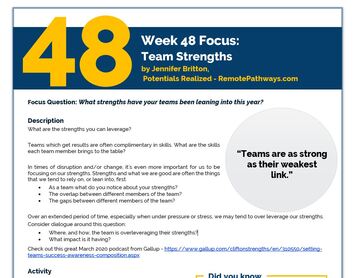 Focus Question: What strengths have your teams been leaning into this year? Description What are the strengths you can leverage? Teams which get results are often complimentary in skills. What are the skills each team member brings to the table? In times of disruption and/or change, it’s even more important for us to be focusing on our strengths. Strengths and what we are good are often the things that we tend to rely on, or lean into, first.
Over an extended period of time, especially when under pressure or stress, we may tend to over leverage our strengths. Consider dialogue around this question:
Check out this great March 2020 podcast from Gallup . 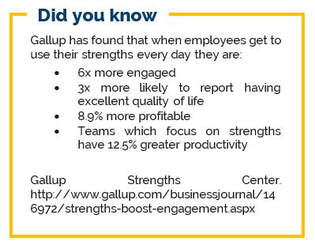 Activity This week spark a dialogue around strengths. If you have done some strengths-based work (see the earlier focus in Week 8 of the Remote Pathways 52 weeks guide), spend time exploring it… Possible avenues to explore are StrengthsFinder 2.0 OR VIA Strengths. What do you notice about your strengths? What’s working? What blindspots have you created? What’s not working? For more on this topic check out: Section 1 and 2 of Coaching Business Builder and PlanDoTrack. Enjoy! Jennifer Jennifer Britton
Co-host of the Remote Pathways Podcast Potentials Realized – Coaching, Training and Consulting Services for remote teams, leaders and professionals Check out the most recent Remote Pathways Podcast Episode, where we explore the people, places and processes of exceptional remote work. You can listen to the latest episode here, or on your favorite podcast player.
1 Comment
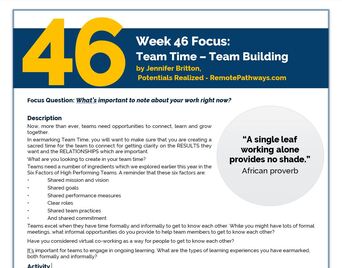 Focus Question: What’s important to note about your work right now? Description Now, more than ever, teams need opportunities to connect, learn and grow together. In earmarking Team Time, you will want to make sure that you are creating a sacred time for the team to connect for getting clarity on the RESULTS they want and the RELATIONSHIPS which are important. What are you looking to create in your team time? Teams need a number of ingredients which we explored earlier this year in the Six Factors of High Performing Teams. A reminder that these six factors are:
Have you considered virtual co-working as a way for people to get to know each other? It’s important for teams to engage in ongoing learning. What are the types of learning experiences you have earmarked, both formally and informally? 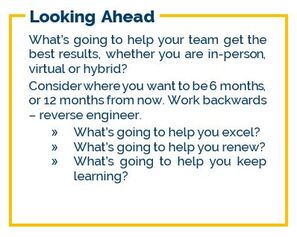 Activity Review where you are as a team. Consider what team development activities you have planned. For more on this topic check out: Episode 15 (Team Effectiveness) and Episode 20 (Virtual Co-working) of the Remote Pathways podcast and the associated download. You’ll find it here. Also check out Chapters 10 and 11 of Effective Virtual Conversations, Jennifer Britton’s 2017 book, Effective Virtual Conversations, which focuses on Virtual Team Development and Virtual team Learning Jennifer Britton
Co-host of the Remote Pathways Podcast Potentials Realized – Coaching, Training and Consulting Services for remote teams, leaders and professionals Check out the most recent Remote Pathways Podcast Episode, where we explore the people, places and processes of exceptional remote work. You can listen to the latest episode here, or on your favorite podcast player. 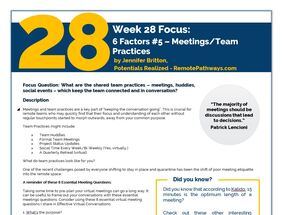 Focus Question: What are the shared team practices – meetings, huddles, social events – which keep the team connected and in conversation? Description Meetings and team practices are a key part of “keeping the conversation going”. This is crucial for remote teams who may quickly find that their focus and understanding of each other without regular touchpoints started to morph outwards, away from your common purpose. Team Practices might include:
What do team practices look like for you? One of the recent challenges posed by everyone shifting to stay in place and quarantine has been the shift of poor meeting etiquette into the remote space. A reminder of these 8 Essential Meeting Questions: Taking some time to pre-plan your virtual meetings can go a long way. It can be useful to frame out your conversations with these essential meetings questions. Consider using these 8 essential virtual meeting questions I share in Effective Virtual Conversations: 1. What’s the purpose? 2. What takeaways do we want? 3. Who needs to be on the call? 4. What preparation is needed for us to be most effective in the meeting? 5. What pace to do we want in order to keep it engaging? 6. What will help keep the focus? 7. What’s absolutely essential? (Versus what will be nice to cover or where can people go for more information around topics?) 8. What follow up might be required? (Excerpt: Effective Virtual Conversations, Britton, page 304, 2017) 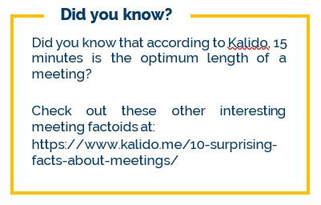 Activity Take stock of the team practices you use. What’s important to note? For more on this topic check out Chapter 9 of Effective Virtual Conversations on Meetings in the Virtual Space. Wishing you the best, Jennifer Jennifer Britton
Co-host of the Remote Pathways Podcast Potentials Realized – Coaching, Training and Consulting Services for remote teams, leaders and professionals Check out the most recent Remote Pathways Podcast Episode, where we explore the people, places and processes of exceptional remote work. You can listen to the latest episode here, or on your favorite podcast player. 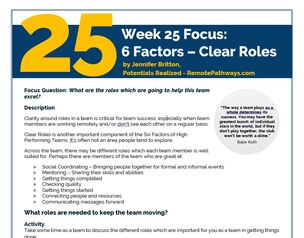 Focus Question: What are the roles which are going to help this team excel? Description Clarity around roles in a team is critical for team success, especially when team members are working remotely and/or don’t see each other on a regular basis. Clear Roles is another important component of the Six Factors of High Performing Teams. It’s often not an area people tend to explore. Across the team, there may be different roles which each team member is well suited for. Perhaps there are members of the team who are great at:
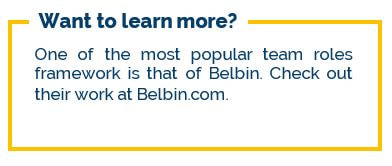 Activity Take some time as a team to discuss the different roles which are important for you as a team in getting things done. What are the roles which are going to help the team? Who plays what role? How do the roles match with the talents and skills in the team? Are there any roles that are missing? What are the roles which are going to create new things? Get things done? You will also want to explore WHAT key roles are needed by the team? Best wishes, Jennifer Jennifer Britton
Co-host of the Remote Pathways Podcast Potentials Realized – Coaching, Training and Consulting Services for remote teams, leaders and professionals Check out the most recent Remote Pathways Podcast Episode, where we explore the people, places and processes of exceptional remote work. You can listen to the latest episode here, or on your favorite podcast player.  Focus Question: What else is required to help the team excel? Description Regardless, of whether we are face-to-face or working remote, teams are teams are teams. Over the last few decades team effectiveness research continues to validate core elements which teams need in order to thrive. The ingredients come from the research of professionals including: Katzenbach and Smith (The Wisdom of Teams), Hackman and Wageman (A Theory of Team Coaching) and others. Part of great leadership in complexity is about distilling things down to their core. When it comes to teamwork it can be beneficial to get back to the basics. When I work with teams, I like to share with them the following six elements which I call the Six Factors of High Performing Teams. These are six things that teams need in order to excel. 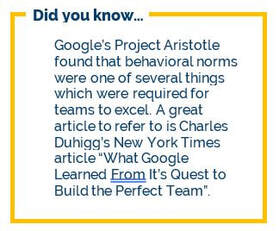 As you step into this week, as a team, take the pulse of where you are on a scale of 1 - 10 the first 3 areas needed for team effectiveness: 1. Shared purpose or mission (Your WHY) What is your purpose? Your mission? Why do you exist? Does everyone hold the same understanding? What does this mean practically for your work? What priorities does your purpose or mission naturally create? 2. Shared behavioral norms How do you do things? What is acceptable and unacceptable on the team? What behaviors and habits exist? Which ones are supportive of exceptional performance? Which ones aren't? 3. Shared commitment What are team members committed to? What will you get done, no matter what? Is there anything that needs to be dropped off the list?  Activity Where are we in each of the Six Factors? What requires attention? For more on this topic check out: Teams365 #1145 – Team Leader Breakfast Series – Six Factors (Audio) Teams365 #1920- Team Development – Revisiting the Six Factors Enjoy your reflections! Jennifer Jennifer Britton
Co-host of the Remote Pathways Podcast Potentials Realized – Coaching, Training and Consulting Services for remote teams, leaders and professionals Check out the most recent Remote Pathways Podcast Episode, where we explore the people, places and processes of exceptional remote work. You can listen to the latest episode here, or on your favorite podcast player. 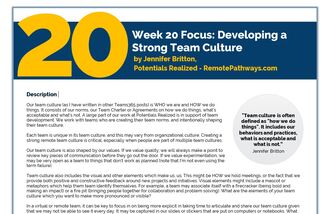 Description Our team culture (as I have written in other Teams365 posts) is WHO we are and HOW we do things. It consists of our norms, our Team Charter or Agreements on how we do things, what’s acceptable and what’s not. A large part of our work at Potentials Realized is in support of team development. We work with teams who are creating their team norms, and intentionally shaping their team culture. Each team is unique in its team culture, and this may vary from organizational culture. Creating a strong remote team culture is critical, especially when people are part of multiple team cultures. Our team culture is also shaped by our values. If we value quality, we will always make a point to review key pieces of communication before they go out the door. If we value experimentation, we may be very open as a team to things that don’t work as planned (note that I’m not even using the term failure). Team culture also includes the visual and other elements which make us, us. This might be HOW we hold meetings, or the fact that we provide both positive and constructive feedback around new projects and initiatives. Visual elements might include a mascot or metaphors which help them team identify themselves. For example, a team may associate itself with a firecracker (being bold and making an impact) or a fire pit (bringing people together for collaboration and problem solving). What are the elements of your team culture which you want to make more pronounced or visible? In a virtual or remote team, it can be key to focus in on being more explicit in taking time to articulate and share our team culture given that we may not be able to see it every day. It may be captured in our slides or stickers that are put on computers or notebooks. What structures do you want to use to make it visible? 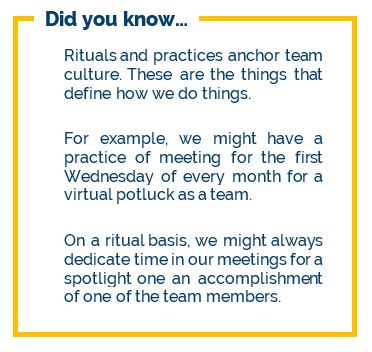 Activity What are the elements of your team culture? Think about the things that make your team unique. This might include HOW you meet. WHAT you prioritize. Any sayings or taglines you embrace. Team culture also speaks to HOW you do things. What is acceptable on this team? What is not? What team agreements and norms do you have in place? Consider the question this week "What are three adjectives to describe your team culture?". What do these adjectives say about you? What you value? How is it reflected in your work?" For more on this topic check out: Teams365 #1526 at Potentials Realized.com - Team Culture Teams365 #2156 – Keeping Your Remote Team All On One Page at PotentialsRealized.com All the best, Jennifer Jennifer Britton
Co-host of the Remote Pathways Podcast Potentials Realized – Coaching, Training and Consulting Services for remote teams, leaders and professionals Check out the most recent Remote Pathways Podcast Episode, where we explore the people, places and processes of exceptional remote work. You can listen to the latest episode here, or on your favorite podcast player. 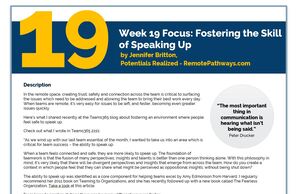 Description In the remote space, creating trust, safety and connection across the team is critical to surfacing the issues which need to be addressed and allowing the team to bring their best work every day. When teams are remote, it’s very easy for issues to be left, and fester, becoming even greater issues quickly. 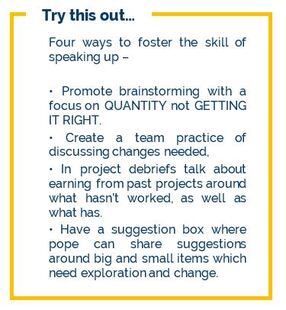 Here’s what I shared recently at the Teams365 blog about fostering an environment where people feel safe to speak up. Check out what I wrote in Teams365 2221: “As we wind up with our last team essential of the month, I wanted to take us into an area which is critical for team success – the ability to speak up. When a team feels connected and safe, they are more likely to speak up. The foundation of teamwork is that the fusion of many perspectives, insights and talents is better than one person thinking alone. With this philosophy in mind, it’s very likely that there will be divergent perspectives and insights that emerge from across the team. How do you create a context in which people feel that they can share what might be perceived as oppositional insights, without being shut down? The ability to speak up was identified as a core component for helping teams excel by Amy Edmonson from Harvard. I regularly recommend her 2011 book on Teaming to Organizations, and she has recently followed up with a new book called The Fearless Organization. Take a look at this article. From large to small invitations there can be many different ways we foster conversation across a team. This might include:
What other barriers are being created around inviting everyone’s voice to the table?” Activity Have a discussion this week around what Speaking Up can look like in your team or organization, and what the value of it is. For more on this topic check out: Speak Up, Show Up and Stand Out – Loretta Malandro Teaming – Amy Edmondson Best wishes, Jennifer Jennifer Britton
Co-host of the Remote Pathways Podcast Potentials Realized – Coaching, Training and Consulting Services for remote teams, leaders and professionals Check out the most recent Remote Pathways Podcast Episode, where we explore the people, places and processes of exceptional remote work. You can listen to the latest episode here, or on your favorite podcast player. 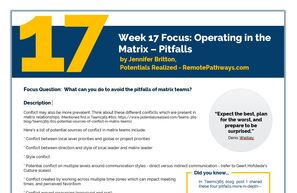 Focus Question: What can you do to avoid the pitfalls of matrix teams? Description Conflict may also be more prevalent. Think about these different conflicts which are present in matrix relationships. (Mentioned first in Teams365 #601: https://www.potentialsrealized.com/teams-365-blog/teams365-601-potential-sources-of-conflict-in-matrix-teams) 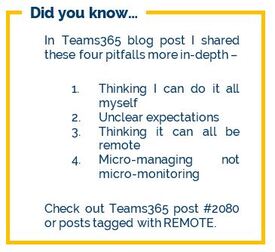 Here's a list of potential sources of conflict in matrix teams include:
 Activity Consider the matrix relationships you are part of. What are the pitfalls you might encounter? The conflicts which might exist? What can you do to create an antidote around them? For more on this topic check out: Teams365 blog posts on this topic over at Potentials Realized.com. Including:
All the best, Jennifer Jennifer Britton
Co-host of the Remote Pathways Podcast Potentials Realized – Coaching, Training and Consulting Services for remote teams, leaders and professionals Check out the most recent Remote Pathways Podcast Episode, where we explore the people, places and processes of exceptional remote work. You can listen to the latest episode here, or on your favorite podcast player. |
AuthorThe Remote Pathways blog follows many of the themes we explore in the Remote Pathways Podcast. This year (2020) we're proud to bring you a 52 week-series for you to follow along throughout the year. Posts are penned by co-host Jennifer Britton, an avid award-winning blogger for many years. Jennifer is the author of five books. Visit her author page on Amazon. Archives
December 2020
Categories
All
|

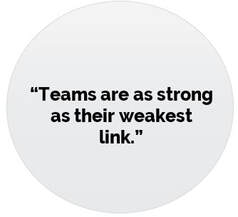



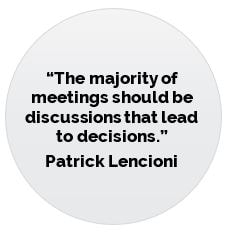

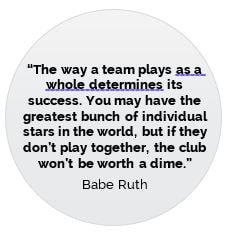

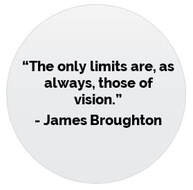
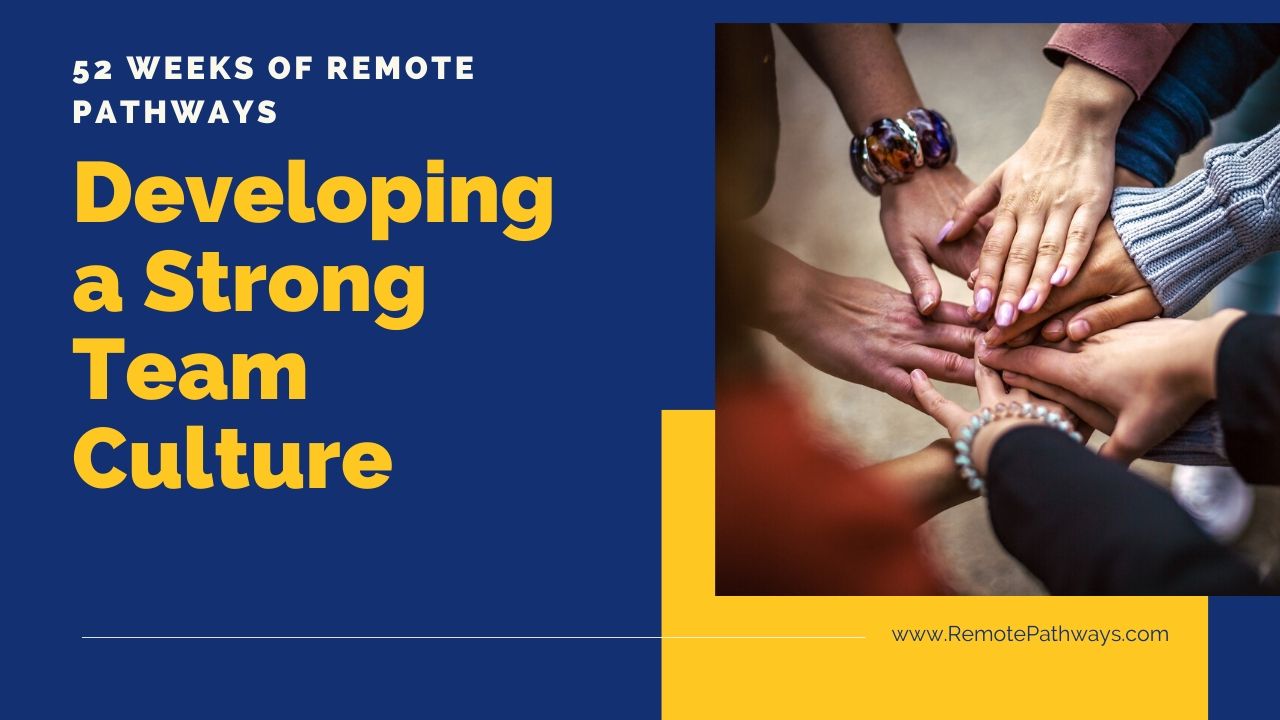
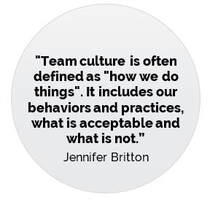

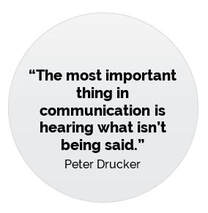

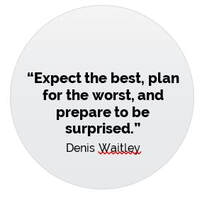
 RSS Feed
RSS Feed